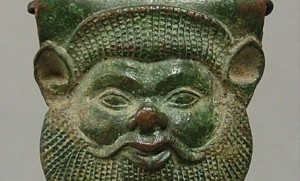Robin Symes was once a very rich art and antiquities dealer who had houses all over the continent and chauffeur-driven Bentleys. He sold multi-million dollar pieces to major museums and private collectors, many of which turn out to have been looted. Among his sources was the notorious Giacomo Medici, currently appealing his 10-year prison sentence for smuggling stolen antiquities. Among his buyers was former Getty curator Marion True, currently on trial for acquiring said stolen antiquities.
His beautiful house of cards came falling down in 1999 when his personal and professional partner of almost 30 years, Christo Michaelides, fell on the stairs, hit his head on the radiator and died. Michaelides’ heirs expected to inherit 50% of Symes’ business, but Symes, in a truly scuzzy dick move, claimed that Christo had been employee, not a partner, so he owed the family nothing. The family was not happy. The family is also hugely wealthy (shipping fortune, like Onassis). The family sued. The family won. Symes went bankrupt and spent 2 years in prison for contempt of court for repeatedly lying about his assets. Read more about the whole sordid story in this excellent article.
Bonhams in London was forced to withdraw a Robin Symes lot from its sale of the Geddes Collection in October of 2008 when the Italian government claimed ownership. In fall of 2009, Bonhams held an art sale of Symes’ collection, but it was all contemporary pieces because any antiquities Symes touched are disputed due to his long history of illegally exporting and selling looted antiques.
You’d think the Home Office would therefore avoid all of Symes’ filthy (sometimes literally; many of the artifacts still have dirt encrustations proving they were recently torn from the ground) lucre, but instead it has chosen to take a radical 180 degree turn and force the sale of 1,000 antiques from Symes’ vast collection. The government has a big ol’ tax bill to recoup, after all, and Symes has no money left, just thousands of looted antiquities.
In documents seen by the Observer, Paolo Giorgio Ferri, the relevant prosecutor in Rome, has repeatedly asked Britain to return the Symes antiquities to their “rightful owner”. The UK government has caused fury by stating that the antiquities could instead be bought.
Symes’s collection includes objects dating back 3,000 years, which Rome says form a vital part of Italian heritage. Ferri said: “It’s like the Italian government making a profit from the mafia selling drugs.”
Renfrew said: “These illicitly exported objects are being sold to pay Robin Symes’s debts, which means that they are being sold for the benefit of the British government. This does reflect unfavourably on the British Treasury and Revenue and Customs, as they are encouraging the sale of material that the Italians say is looted.
“Many of the antiquities are Etruscan and could only have been found in Italy. They left Italy illegally because they would require an export licence. I can’t see how the Home Office can dispute that.”
One of the items up for sale is a fragment from a vase the Getty was recently, um, persuaded to return to Italy because it was looted. How shameless can you get?
The estimates are insanely low, too, because it’s a liquidation sale. The expected income from the sale of 1,000 rare antiquities is a meager £100,000 ($155,000). Symes, shady sumbitch that he is, squirreled away his stash of antiquities in over 30 warehouses, selling them on the quiet during his legal troubles, selling them loud and proud to museums and collectors worldwide before then. According to Peter Watson and Cecilia Todeschini’s outstanding book The Medici Conspiracy, Symes kept 17,000 objects worth an estimated £125 million ($210 million) in those warehouses. So you see that £100,000 figure is a joke.
The Home Office has so far dragged its feet in responding to Italian requests for legal records on the antiquities’ arrival in Britain. By international law, these records should be provided before any sale, but instead the government is pulling one of the Metropolitan Museum of Art’s favorite tricks and asking for proof that the artifacts were stolen.
Neither the liquidator nor the Home Office will comment publicly. There’s not even a set date for the sale yet. Here’s hoping the stink Italy is raising now will prevent it from happening at all.

Who is Symes? Not Sir Ronald I assume.
Nope. Mr. Robin. I added a couple of explanatory paragraphs. 🙂
This sort of story always amazes me. Here’s a guy who was smart/crafty enough to build a huge fortune on looted stuff, which presumably requires a lot of innovative thinking and dastardly plotting. Then, he stupidly tries to screw his partner’s heirs out of their share of the take, even knowing that they have the financial wherewithal to get even. Amazing. I guess he was blinded by greed, but even still. It’s like something out of a grocery-store novel.
He had gotten away with so many blatant illegalities for so many decades, I guess he thought he could pull off this scheme too. I think the part that most disgusts me is how he trampled on the memory of someone who had been by his side for 30 years. Christo’s family had had a good relationship with Symes — something that was by no means a given considering they became a couple in the 70s — so for him to dismiss their partnership as an employer-employee one just to screw his heirs out of their fair share is pretty damn low.
Oh, and Christo’s family had helped them financially too. Ugh.
In an era before civil partnerships it is perfectly reasonable not to want to pay the family half of everything. Christo’s family had enough- they’re the greedy ones. It was Symes’s company, not Christo’s.